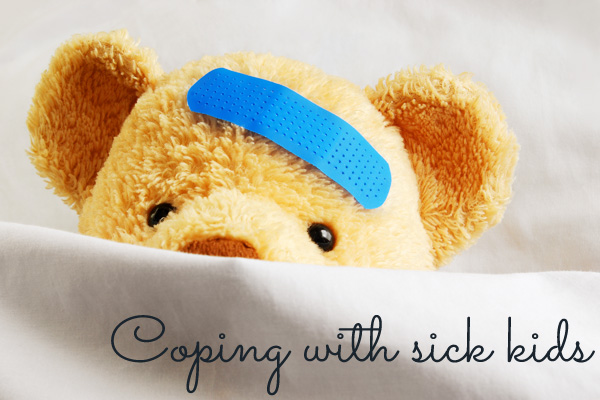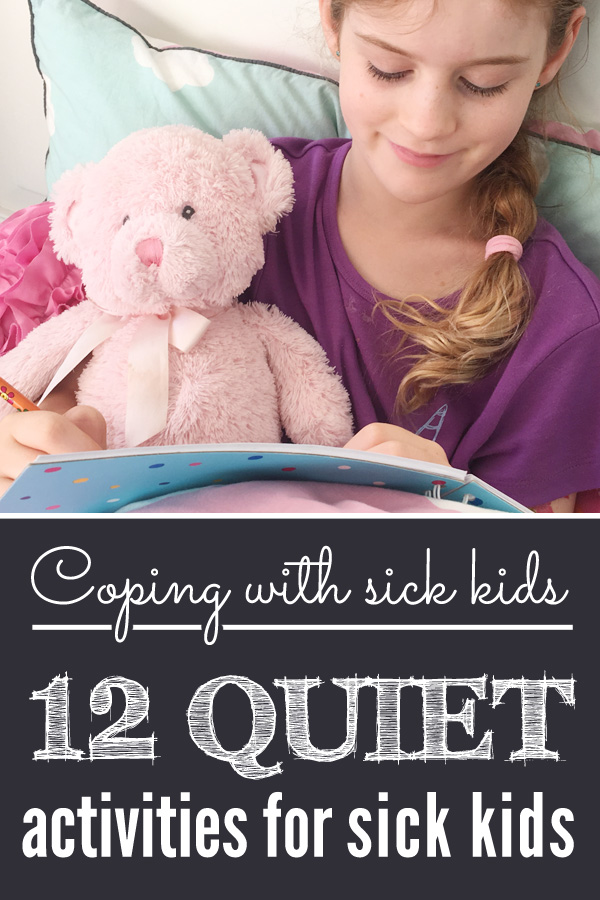Coping When Kids Are Sick: 12 Quiet Activities for Sick Kids
This post is sponsored by Healthdirect Australia.
“Mummy, my new year’s resolution is not to vomit this year,” my then six year old declared.
I wasn’t surprised, given just how sick she’d recently been with gastro. We’d arrived at the emergency department of our local hospital in the early hours of the morning, after a night of seemingly constant vomiting, and were greeted with the comment “Wow, she’s green,” from the triage nurse. Not only was she a pale and sickly shade of green but her brow was slick with sweat, she hardly had the energy to stand and, despite enduring more than eight hours of vomiting, she still couldn’t keep down even the tiniest sip of water.
In response, I smiled the weary smile of a mother who has spent the evening emptying sick buckets and consoling a tired, sick child desperate for rest and worried that I had waited too long before heading to the hospital. I find it one of the hardest parts of parenting, double guessing myself as I ummm and ahhh about seeking medical advice when my children are sick or injured. I have always erred on the side of caution, figuring it is better to take them to the hospital or doctor than not but when you are sent away more than once with the instruction to wait and see, you can begin to doubt your own judgment.
Fortunately, Australians have healthdirect on their side. I cannot tell you how many times I have called the healthdirect helpline seeking medical advice. When it is clearly not a medical emergency, speaking to a registered nurse when you are unsure how to proceed is invaluable. As well as the phone service, healthdirect also provides access to helpful information through the healthdirect website and smartphone app, where you will find;
- A comprehensive symptom checker that advises you of the appropriate action to take based on the details entered, with information to help you understand the symptoms
- The symptom checker offers a recommendation, listing self care strategies, or advising you to speak to a nurse via the healthdirect service, head to hospital or call emergency services (000)
- A very handy directory of doctor’s surgeries, pharmacies and hospitals that are open now in your local area
- An Australian Government funded resource, the website includes a searchable database of comprehensive, up to date health information.
Handy, hey??! As for my pint sized patient, some medication to stop her vomiting, hydrolyte icy poles to get her started back on fluids (as dehydration is a primary concern in this type of situation), and sleep saw her on the mend and us both resting peacefully once again. She spent the next few days on the couch recovering and if there is one thing worse than a sick kid it might just be a restless, bored kid in recovery!
Our strategy for that one is a comfy couch bed, plenty of TV in between regular naps and some simple, quiet activities that can be done on the couch. Here are 12 of our favourites for school aged kids.
12 Quiet Activities for School Aged Kids
1. Create sticker drawings
2. Play write on my back: take turns writing secret messages with your finger onto each other’s backs. Can you work out what the message says?
4. Write letters or make postcards
5. Make ransom notes with letters cut from magazines
6. Fold paper planes
7. Make your own scratch art sheets
8. Play card games or board games
9. Try one of these digital word games
10. Read to each other
12. Give each other manicures or pedicures
And how did Immy go with her rather ambitious resolution? She somehow managed to make the full twelve months without vomiting. In fact, I think we are close 16 months now. Thank goodness for that!
What are your go-to sick day activities?



It’s the hardest think about parenting I reckon… figuring out whether to take them to the Dr or hospital and sit around in a waiting room with a sick and miserable kid for hours only to be told there is nothing they can do… or wait and see at home when you really do need medical care! I struggle with this a lot!!!
Agreed!
I love health direct, they’re so handy. Great list of activities too!
That symptom checker looks fabulous and perfect for when you are needing advice and learn what action to take next. I always feel like I struggle myself when my kids are sick so your quiet activities I’ll have on hand for when I need them. Thanks.
Oh it is hard to know! So true. I actually used this site last week for my sick 2 year old, was really helpful
I needed this a week ago! Pinning, saving and sharing…as I know the cold and flu season has only just begun…and it looks like it’s going to be a bumpy ride this year.
A great list of quiet activities. There’s only so much TV they can watch when they’re sick. Will bookmark this site for next time one of my little ones is unwell. Great post! Xx
Thats a useful list and definitely a useful service! Our go-to activities are probably reading, rest and a dvd or two.